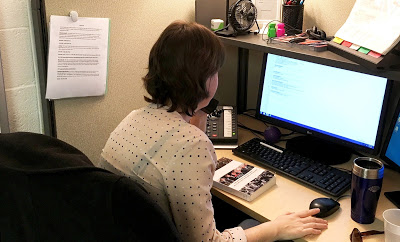Friendly phone calls help older adults avoid depression
 |
| A CareRing volunteer makes a friendly phone call to a senior. [PRS Inc.] |
Older adults still capable of living independently can feel
socially isolated and depressed.
socially isolated and depressed.
A new program launched by PRS Inc. in January called
CareRing aims to help by arranging for volunteers to call older residents
living alone regularly just to chat –and to provide some emotional and social
support.
CareRing aims to help by arranging for volunteers to call older residents
living alone regularly just to chat –and to provide some emotional and social
support.
“I talk to people about their pets. One man has a really
great dog and told me about taking his dog to a pet baptism at his church,”
says Mary, a volunteer with CareRing.
great dog and told me about taking his dog to a pet baptism at his church,”
says Mary, a volunteer with CareRing.
One woman likes to talk about the TV shows she likes to
watch, and others like to discuss current events or personal issues. Another
recent call was about a rude staff person at a doctor’s office, Mary says.
“It’s fun to hear different people’s perspectives on things. Everybody’s
unique.”
“We recognize many older adults don’t necessarily need
services like assisted living, but do need some support,” says Laura Mayer, the
director of CareRing at PRS. The new program is actually called CareRing 2.0
because it builds on a smaller, more limited program.
services like assisted living, but do need some support,” says Laura Mayer, the
director of CareRing at PRS. The new program is actually called CareRing 2.0
because it builds on a smaller, more limited program.
“Finding ways to connect with older adults is important for
their quality of life,” says PRS CEO Wendy Gradison. “CareRing is an affordable
and proven way to reduce isolation” and to help people age in place.
their quality of life,” says PRS CEO Wendy Gradison. “CareRing is an affordable
and proven way to reduce isolation” and to help people age in place.
Participants must be Fairfax County residents over 60 and must
the have the ability to take phone calls. PRS is seeking about 35 more clients
through the end of June and will be able to add 50 more after that. The program
is free.
the have the ability to take phone calls. PRS is seeking about 35 more clients
through the end of June and will be able to add 50 more after that. The program
is free.
During the first phone call, volunteers do a quick
assessment – to determine whether the person is depressed, suicidal, feeling
isolated, or at risk for abuse or neglect, and asks about their physical
well-being and financial security, Mayer says. If there is a problem, PRS
follows up by referring them or their relatives to the appropriate resources.
assessment – to determine whether the person is depressed, suicidal, feeling
isolated, or at risk for abuse or neglect, and asks about their physical
well-being and financial security, Mayer says. If there is a problem, PRS
follows up by referring them or their relatives to the appropriate resources.
After that, the calls, usually about 10 to 15 minutes, are social,
although volunteers do offer helpful advice, like reminding client to take
their medications. Clients can decide if they want to be called every day or a few times a week.
although volunteers do offer helpful advice, like reminding client to take
their medications. Clients can decide if they want to be called every day or a few times a week.
Volunteers are trained in how to start a conversation. They
ask clients about their interests, how they can get more involved in their
community, their opinions on the news, their careers, and meaningful events in
their lives.
ask clients about their interests, how they can get more involved in their
community, their opinions on the news, their careers, and meaningful events in
their lives.
Often, clients stick to superficial topics, like what’s
going on that day, Mayer says, but they sometimes get into more challenging
conversations about their grief at losing someone close, the complications of
aging, or their complex relationships with adult children.
going on that day, Mayer says, but they sometimes get into more challenging
conversations about their grief at losing someone close, the complications of
aging, or their complex relationships with adult children.
“People share more information when it feels anonymous,” she
says. “They have no idea how old we are,
so there are fewer barriers to communication.”
says. “They have no idea how old we are,
so there are fewer barriers to communication.”
Because she never sees them in person, Mary says, has no
idea what they look like, so there’s none of that judging based on first
impressions.
idea what they look like, so there’s none of that judging based on first
impressions.
If a client doesn’t answer after three attempts to call, PRS
contacts a relative or asks the police to drop by for a welfare check.
contacts a relative or asks the police to drop by for a welfare check.


What a neat idea! I love it when something so creative and yet simple makes such a positive difference.